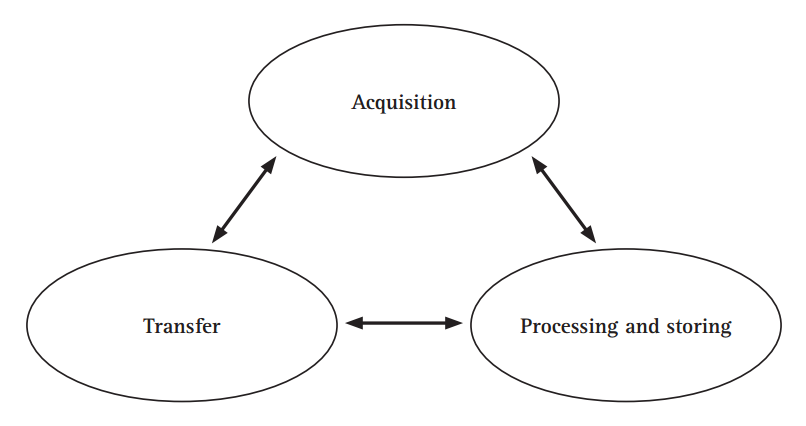2 – Work file 1: Three stages in a learning process
Living Democracy » Textbooks » 2 – Work file 1: Three stages in a learning processIn every learning process we may distinguish between three closely linked phases which support one other.

Acquisition of information
Acquisition
watching, seeing, smelling, touching, tasting, hearing, feeling, perceiving, meeting, approaching, experiencing, considering
Questions on the students’ acquisition of information
Previous knowledge
How can the students (re-)activate their previous knowledge?
Asking questions
Can the students deal with the topic in a way that they may think of questions?
Senses
Can the students use their different senses to acquire new information?
Do the students learn by seeing, looking, perceiving, hearing, listening, feeling and emotion, touching, tasting, smelling, etc?
Illustrating (adding appeal and colour to a topic)
Are illustrations, models or replicas used?
Processing and storing of information
Processing and storing
exploring, solving problems, understanding, comprehending, acquiring, memorising, remembering, repeating, habitualising
Questions on processing and storing of information
Structure
Are the contents organised in a way that the preceding steps of learning facilitate the following ones?
Points of reference
Can the students link new information to their previous knowledge?
Level of attainment
Are the tasks set for the individual student – male and female – demanding and challenging, but still within their reach?
Deepening of understanding
Are the assigned tasks and settings suitable for the students to reinforce and deepen what they have learnt?
Record
Do the students produce a record of their results (report, poster, notes, drawing, diagram, rough sketch, etc.)?
Practice
Do the students have the opportunity to practise their newly acquired abilities and skills in as wide a variety of contexts as possible?
Intensity
Have the students been given sufficient time and opportunity to thoroughly work their way through new information and experiences?
Do we spend sufficient time on a subject to allow the students to probe its depths?
Transfer of information
Transfer
application, flexible handling, testing, handling new tasks, confidence, access, action
Learning must always include transfer opportunities for the students – to avoid assessments like “learned, but already forgotten”, or “known, but not understood or reflected”, “accomplished yester-day, already lost today”, or “learned, but not used”.
Questions on the transfer of information
Usefulness
Do the students appreciate and experience the usefulness of what they have learned?
Experience of efficiency (motivation)
Have the students directly experienced the relation between their effort and their progress in learning? Do the students realise that they themselves are responsible for their extension of knowledge, understanding and skills, that is, that they can achieve something by their learning efforts and activities?
Controlling
Are conclusions reviewed and reconsidered?
Further and more advanced studies
Does the learning sequence which the students have completed stimulate their interest to engage in further and/or more advanced studies?
Do the students remain emotionally involved?
Application
Are the students, both boys and girls, offered a wide variety of opportunities to apply what they have learned? Do the students know in what ways their abilities may be applied and if there are limits to the application of their knowledge and skills?

